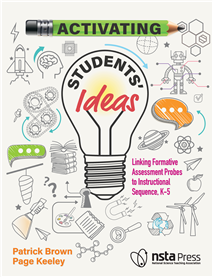All Resources
Web Seminar
Archive: Teacher Tip Tuesday: Reviewing a Proposal for NSTA Conferences, May 2, 2023
During this web seminar, the conference team will guide you through the process of reviewing and giving feedback, ensuring you have all the tools you need to provide a strong evaluation for each proposal. ...
Web Seminar
Are you planning to submit a session, poster, or workshop proposal for educator sessions at the National Conference on Science Education? NSTA conferences offer valuable experiences that place the needs of educators front and center, providing an inv...
Web Seminar
Archive: Science Update: Observing Hurricanes with Ocean Drones, June 8, 2023
Advancing our understanding of hurricanes and improving forecasts require measurements from the most violent parts of the storms, where ships and aircraft cannot safely travel. The ocean-atmosphere interface within a hurricane is difficult to measure...
Book Chapter
AVAILABLE FOR PREORDER! COMING IN MARCH! Science teachers face an incredible challenging task of combining research on how students learn best, the three-dimensions of the Science Education Frameworks that in themselves are complicated to understa...
Web Seminar
The editors of the January/February 2023 issue of The Science Teacher join us to discuss the Special Issue on Immunology. The issue provides space for sharing current teaching strategies and tools for teaching about epidemics and viruses. W...
Journal Article
Adventures in Quander: A QIS Video Game for Secondary Learners
By Devon M. Christman, Collin Lejano, Kaylee Laub, Liliana Garcia, Matthew Bennett, David Gonzalez-Maldonado, Tianle Liu, Grace Williams, Danielle Harlow, Diana Franklin, and Emily Edwards
Journal Article
Connecting a Community Through Computational Thinking and Robotics
By Robin Jocius, Jennifer Albert, Rachana Bhonsle, Deepti Joshi, W. Ian O’Byrne, and Melanie Blanton
Journal Article
Using Open-World Games to Support Inclusive Approaches to Computational Thinking
By Dorothy Bennett, Cornelia Brunner, Nicholas Hartmann, and Stephen Uzzo
Web Seminar
Archive: Science Update: Europa Clipper: Exploring an Ocean World, May 11, 2023
In this web seminar, a team from NASA’s Jet Propulsion Laboratory will share information about the exciting Europa Clipper mission that will explore Jupiter’s moon Europa. Launching in 2024, Europa Clipper will study Europa’s icy surface and su...
Web Seminar
Archive: NSTA Teacher Awards – Looking for the Best of the Best, October 17, 2023
Did you come up with an innovative way to teach a lesson? Have you devoted your life to promoting science and the teaching of science? Did you successfully transform science teaching in your classroom? If you answered yes to any of these questions, t...
Web Seminar
Archive: Nominations – Your Opportunity to Serve, Inform and Lead, September 21, 2023
Question…What do you think the “face of success” looks like? We think it looks like YOU volunteering your time, providing your viewpoints, and applying your experiences. NSTA’s goal is to create a governing body that represents t...
Web Seminar
There will be an annular solar eclipse on October 14, 2023 and a total solar eclipse on April 8, 2024 in the US – an Eclipse Double-Header – with everyone in North America seeing at least a partial eclipse....
Web Seminar
Archive: Science Update: An Eclipse 'Double-Header' is Coming this School Year! August 31, 2023
There will be an annular eclipse this fall and a total eclipse next spring visible in the U.S. Join veteran astronomers and educators Dennis Schatz and Andrew Fraknoi to learn more about what's happening, where the eclipses will be visible, how to vi...
Journal Article
The Birds and the Bees, the Flowers and the Trees
By Laura Wheeler, Rita Hagevik, Kathy Cabe Trundle, Michelle Parslow, and Katherine Vela
Journal Article
The (Trans)Formative Assessment Planning Template
By Caitlin Gailey McClearyCale Fine, Haeyoung Littich, and Maren Getz
Journal Article
Engineering for Ecological and Social Justice
By Veronica Cassone McGowan and Todd Campbell
Journal Article
By Catherine E. Matthews, Katie Singleton, Manda M. Jackson, Cory A. Bentley, and Heidi Carlone
Journal Article
Learning to Teach with Science Representations
By Meredith Park Rogers, Cindy Hmelo-Silver, Celeste Nicholas, Dionne Cross Francis, and Joshua Danish
Journal Article
By Sara Willner-Giwerc, Rachel Hsin, Sonia Mody, and Chris Rogers
Journal Article
By Ellen Gow, Jerrid Kruse, Susan Wees, Kristy Dee, and Leslie Hernandez
Journal Article
By Colby Tofel-Grehl, Sarah Braden, Candace Penrod, Laura Wheeler, Tyler Hansen, Andrew Jones, and Clayton Chamberlain
Journal
Science and Children—January/February 2023
Volume 60, Number 3 Energy In this issue of Science and Children, we address energy by examining how it can be a starting point for deeper learning, help build student-generated testable questions, foster scientific explanations, and allow st...
Journal
Science Scope—January/February 2023
Volume 46, Number 3 Ecosystems: Interactions, Energy, and Dynamics A healthy ecosystem can be defined as one that “has the ability to maintain its structure and function over time in the face of external stress.” Managing ecosystems in...




